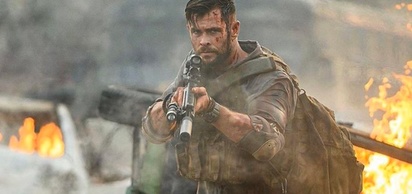The Vast of Night
2020 was a year of remarkable debuts, and few more remarkable than this absolute gem from Andrew Patterson. Set during one night in the late 1950s, The Vast of Night follows two high school students, Fay Crocker (Sierra McCormick) and Everett Sloan (Jake Horowitz), who while operating a local radio station start to pick up something strange. The strangeness of the film comes from the events that may be taking place, as well as the beautifully assured delivery. Long takes track through the town for minutes at a time, and much of the action is delivered by sound, especially people talking through radios and telephones. This runs counter-intuitive to standard film logic of show don’t tell, yet The Vast of Night achieves a great deal by telling rather than showing. The intelligent script and strong performances are aided by superb period detail, both in terms of production design and social conditions, and while there is clear homage this never overwhelms the drama. The pacing is perfect and the film wonderfully atmospheric, leaving a genuine sense of mystery and pathos.
Da 5 Bloods
Da 5 Bloods is everything you would expect from a Spike Lee Joint. Smart, fast-talking characters; sudden eruptions of violence; a strong sense of political indignation; an eclectic visual style. At times, Lee’s tale of Vietnam veterans returning to the scene of their earlier combat feels overdone, but what Da 5 Bloods lacks in subtlety it makes up for in power. The theme of legacies runs throughout the film, including the racial history of African American soldiers, the colonial legacy of the Vietnam conflict, familial ties including bloodlines and military camaraderie, national and personal trauma, while finance and immigration make appearances as well. The heady mixture can be disparate and the film lacks the focused punch of Lee’s previous film, BlacKkKlansman, but Da 5 Bloods is still a stylish, timely and urgent drama.
Extraction
On the one hand, Extraction is a very standard and almost retrograde film. It is a straightforward action movie, much like those of the 1980s and 90s that made performers like Steven Seagal and Jean-Claude Van Damme stars, as established brawny beefcake Chris Hemsworth plays Tyler Rake, an exceptionally talented ex-special forces operative (aren’t they all?) who is called in to perform, wouldn’t you know it, an extraction. Rake plunges into the dangerous world of Dhaka, Bangladesh, to rescue the son of a crime lord from another crime lord, takes on an entire army and seems to blow up half the city. It also plays to white saviour expectations as almost every person of colour Rake encounters is either a helpless victim or a violent criminal. We’ve pretty much seen all this before.
However, Extraction still manages to be a wildly entertaining ride, as stunt coordinator turned director Sam Hargrave embraces the action chase thriller wholeheartedly, and brings a genuine sense of punchy style and outright nastiness to the proceedings. Action films are often sanitised, but Extraction offers brutal violence, a sense of mental as well as physical anguish, and even consequence. Hargrave gives the film a relentless pace, director of photography Newton Thomas Sigel thrusting the viewer into the heart of the Dhaka streets and propelling the viewer through gunfights, car chases and intense physical altercations. This is best expressed in a blistering twelve minute long take along alley ways, up stairways and down walls, with enemies appearing at every turn and all manner of weapons coming into the fray. Think about Extraction and there are a lot of problems. Experience it and you’re in for a hell of a ride.
True History of The Kelly Gang
True History of the Kelly Gang declares from the get go that it is not true. And yet, in some ways, it is. The events of Ned Kelly’s life have been part of cinema for nearly as long as the medium, with multiple representations, interpretations and mediations. Justin Kurzel’s film, with a screenplay by Shaun Grant based on the novel by Peter Carey, is another of these, and not to be taken as an ‘accurate documentation’ of Ned Kelly (George McKay). Instead, it is a jagged and striking drama that tells uncomfortable truths about masculine identity, social immobility and violent oppression. Kurzel’s fragmented visual style blends the expansive and scorched Australian outback with claustrophobic interiors, where the Kelly family and others that Ned encounters, both friend and foe. Ned’s journey to outlaw legend is punctuated with effectively shocking violence as well as dark humour, resulting in a film that holds the viewer’s attention with a cruel and unflinching grip.













